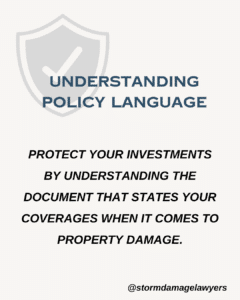Owning a home is a source of pride, but when unexpected events strike, the safety of your property becomes paramount.
In this fast-paced world, understanding the nuances of property insurance claims can be the key to safeguarding your cherished home. Let’s delve into the essential terms every homeowner NEEDS to know in order to navigate the often complex landscape of insurance claims.
Whether you’re a seasoned homeowner or a first-time property owner, the world of insurance claims can be overwhelming.
Accidents, natural disasters, or unforeseen damages are unfortunate but real threats to your property. This is where your understanding of terms related to insurance claims, property insurance, and home insurance can make all the difference in ensuring you get the coverage you deserve.
Our law firm will guide you through the intricacies of property insurance, demystifying jargon that often confuses homeowners. We’ll shed light on essential terms, helping you to communicate effectively with insurance providers and make informed decisions during challenging times.
Property Owners and Insurance Claims:
Property owners often find themselves grappling with terms like “policy exclusions,” “replacement cost value,” and “actual cash value.” Understanding these terms is crucial for a seamless claims process.

Key Terms Demystified:
Navigating through the intricate language of insurance policies can be challenging. Terms like “deductible,” “coverage limits,” and “exclusions” often confuse homeowners.
Here’s a breakdown of key terms you need to know:
Deductible:
- Definition: The amount the policyholder is responsible for paying out of pocket before the insurance coverage takes effect.
- Importance: Understanding your deductible helps in budgeting and planning for potential out-of-pocket expenses.
Coverage Limits:
- Definition: The maximum amount an insurance company will pay for a covered loss.
- Importance: Knowing your coverage limits is crucial to assess whether your policy adequately protects your property.
Exclusions:
- Definition: Specific situations or items that are not covered by the insurance policy.
- Importance: Being aware of exclusions prevents surprises when filing a claim and helps in understanding policy limitations.
Home Inventory:
- Definition: A comprehensive list and documentation of valuable items within the home.
- Importance: Creating and maintaining a home inventory streamlines the claims process in case of loss or damage.
Claim Denial:
- Definition: The rejection of an insurance claim by the insurance company.
- Importance: Understanding reasons for claim denial helps policyholders address potential issues in their claims.
Insurance Premium:
- Definition: The amount paid by the policyholder to the insurance company for coverage.
- Importance: Knowing your insurance premium is essential for budgeting and managing your overall homeownership costs.
Loss Assessment:
- Definition: Charges imposed by a homeowners association (HOA) to cover losses not covered by the association’s insurance.
- Importance: Homeowners in community associations should be aware of potential loss assessment charges.
Liability Coverage:
- Definition: Coverage that protects the policyholder in case they are responsible for injuries or property damage to others.
- Importance: Liability coverage is crucial for protecting homeowners from potential legal and financial consequences.
Actual Cash Value (ACV):
- Definition: The value of property at the time of loss, accounting for depreciation.
- Importance: Understanding ACV helps homeowners assess the compensation they may receive for damaged or lost items.
Insurance claim lawyers serve as your advocates in the complex world of insurance claims. Our role becomes particularly essential when disputes arise over your claim or if the insurance company denies your claim.
Navigating Roof Damage Claims:
Roof damage claims can be intricate, involving various terms such as “storm damage,” “wear and tear,” and “pre-existing conditions.”
Read below to find out how these terms can affect your policy.
Storm Damage:
- Definition: Harm caused to property by severe weather conditions such as hurricanes, tornadoes, or hailstorms.
- Importance: Documenting storm damage promptly is crucial for a successful insurance claim.
Wear and Tear:
- Definition: Gradual damage to property over time due to normal usage.
- Importance: Wear and tear are typically not covered by insurance, emphasizing the need for regular maintenance.
Pre-existing Conditions:
- Definition: Damages that existed before obtaining the insurance policy.
- Importance: Addressing pre-existing conditions during policy application helps avoid complications during the claims process.
When to Call an Insurance Claim Lawyer:
- Recognizing situations where legal expertise is essential.
- How an insurance claim lawyer can maximize your claim.
- There are instances where involving an insurance claim lawyer becomes necessary. If your claim is denied, if you face delays in the settlement process, or if there are disputes over the amount offered, seeking legal counsel is advisable.
Proactive Measures for Seamless Claims:
- Preventive actions to reduce the risk of property damage.
- Strategies for smooth and efficient claims processing.
- Regular maintenance and timely repairs can prevent potential issues that may lead to insurance claims. Creating a comprehensive home inventory and keeping records of valuable items can streamline the claims process in case of loss or damage.
Now you know the basics of your policy language!
Understanding the terminology related to property insurance claims is crucial for homeowners seeking to protect their investments. From the role of insurance lawyers to decoding roof damage, this guide has provided comprehensive insights.
Remember, knowledge is your greatest asset when it comes to insurance claims. Stay informed by subscribing to our email newsletter: https://www.stormlex.com/newsletter/
Featured Photo by Youri Luyten on Unsplash
















